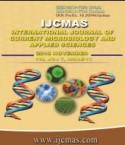


 National Academy of Agricultural Sciences (NAAS)
National Academy of Agricultural Sciences (NAAS)

|
PRINT ISSN : 2319-7692
Online ISSN : 2319-7706 Issues : 12 per year Publisher : Excellent Publishers Email : editorijcmas@gmail.com / submit@ijcmas.com Editor-in-chief: Dr.M.Prakash Index Copernicus ICV 2018: 95.39 NAAS RATING 2020: 5.38 |
This present study has aimed to provide a molecular characterization of rotavirus species A (RVA) and to determine the frequency of RVC and RVH in fecal specimens from non-vaccinated piglets, across 5 farms in the metropolitan mesoregion of Belém, within the Amazon region, Brazil. In the previous study, porcine RVA was found in 9.9% (17/172) during the years 2008-2009. Using RT-PCR, Sanger nucleotide sequencing, and phylogenetic analyses, the entire genomes of 17 Brazilian porcine RVA strains were analyzed. The results indicated that all strains shared the same constellation, with the exception of the VP3 and NSP3 genes, which were M2 and T7 genotypes, respectively. The VP1, VP2, NSP2, NSP4 and NSP5 coding segments clustered into the Wa-like constellation; genotype 1, and VP7, VP4, VP6 and NSP1 genes were typically of porcine origin. RVA genes infecting pigs presented a high degree of nucleotide similarity to strains from other hosts, including humans. Little is known about the zoonotic potential of rotaviruses in Brazil, but the results of this study show dynamic interactions between human and porcine rotavirus strains and constitute an increase in knowledge on the diversity of RVA strains, in animal reservoirs circulating in the Amazon region.
 |
 |
 |
 |
 |